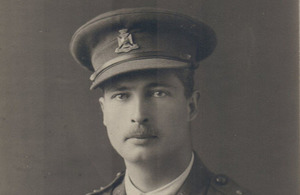WW1 South African VC recipient Reginald Frederick Hayward
The story of South African First World War Victoria Cross recipient Reginald Frederick Johnson Hayward.

Reginald Frederick Johnson Hayward [Credit: The Wardrobe, Home of the Infantry Regiments of Berkshire, and Wiltshire]
14 men from South Africa received the Victoria Cross, Britain’s highest award for gallantry, during the First World War. As part of the Centenary Commemorations the people of the United Kingdom marked their gratitude to those courageous men by presenting a bronze memorial plaque to their home country engraved with their names. The plaque is now displayed at the Castle of Good Hope, Capetown. This archive tells their stories.
Name: Reginald Frederick Johnson Hayward
DOB: 17 June 1891
Place of Birth: Beersheba Mission Station, near Swartberg, East Griqualand
Date of Action: 21 to 22 March 1918
Place of Action: Marcoing, near Fremicourt, France
Rank: Acting Captain
Regiment: 1st Battalion, The Wiltshire Regiment, British Army
Reginald Frederick Johnson Hayward was born on 17 June 1891 near Swartberg, South Africa. He was studying in England at the Royal Veterinary College of Surgeons when war broke out, and enlisted straightaway. He was 26 years old and an Acting Captain in the 1st Battalion, The Wiltshire Regiment of the British Army when he was awarded his Victoria Cross for “almost superhuman powers of endurance” during fighting at Marcoing, near Fremicourt in France. His citation explains further:
In spite of the fact that he was buried, wounded in the head and rendered deaf on the first day of operations and had his arm shattered 2 days later, he refused to leave his men (even though he received a third serious injury to his head from a bazooka) until he collapsed from sheer exhaustion. Throughout this period the enemy were attacking the company’s front without cessation, but Captain Hayward continued to move across the open from one trench to another with absolute disregard of his own personal safety, concentrating entirely on re-organising his defences and encouraging his men. It was almost entirely due to the magnificent example of ceaseless energy of this officer that many more determined attacks upon his portion of the trench system failed entirely.
Hayward later served in the Second World War, and reached the rank of Lieutenant Colonel. He died in London in 1978.